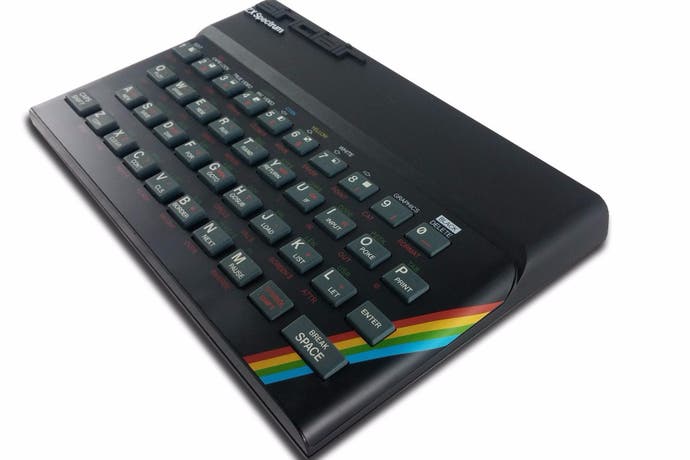Hands on with the Recreated ZX Spectrum
Rubber soul?
The British have a very totemistic self image. We define ourselves by red buses, black taxis, cups of tea and the Sunday roast. Add to that list the iconic Sinclair ZX Spectrum, a pioneering home computer that managed to showcase the best of British innovation as well as our more eccentric nature.
That small, flat, black electronic beermat, with its colourful corner flash and bizarre rubber keyboard, may not be as world famous as a London cab but it seems to attract a similar swell of patriotic and nostalgic longing, at least if the current popularity of the humble Speccy is anything to go by.
Following the machine's 30th anniversary in 2012, which saw mainstream media outlets reminding the nation of our coding roots, there has been a surge in interest that has taken Sinclair's creation from fondly remembered obscurity to pop culture touchstone once again. Often at the forefront of that coverage has been a Kickstarted Bluetooth replica Spectrum, produced by veteran Britsoft publisher Elite Systems.
After a long and fraught development process, a retail release is finally drawing near. It's been a controversial product from the very start, facing cynicism from within the hobbyist Speccy scene regarding its legitimacy as an actual "Spectrum" as well as criticism from the games industry itself after it was revealed that game developers who had licensed their games for use in Elite's apps hadn't been paid.
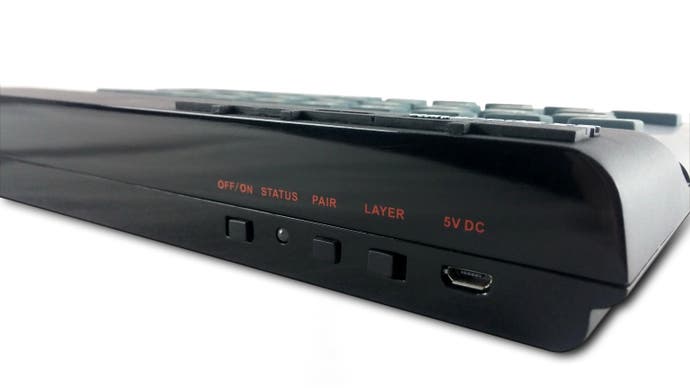
As a lifelong Sinclair fan, I've followed the saga with interest and when I was asked if I wanted a demo of the device ahead of its launch, I jumped at the chance. Not, I should point out, because I'm easily bowled over by the mere sight of a rubber keyboard - I've still got a real Spectrum set up right next to my PC and four shelves of games to play on it - but because I really wanted to see the thing in action and find out what, exactly, it would be able to do.
In physical terms, it's a near perfect likeness. It's slightly lighter than a real 48k rubber key model, but not distractingly so. It doesn't feel cheap or plasticky, which was one of my main concerns. It has the metal faceplate, it has the same lettering, the same multiple BASIC functions sprawling across the keys in a flood of red and white text. The main visual difference is that the embossed logo at the top left is more pronounced than on the real thing. It's noticeable enough for an 8-bit geek like myself to notice, but you'd have to be hopelessly wedded to the past to allow a detail like that to detract from what is otherwise an impressively faithful recreation.
But it is just a recreation - something that is reflected in the name. The trademarks for both Sinclair and ZX Spectrum both now reside with Sky, following BSkyB's takeover of Amstrad, which bought out Sinclair in the 80s. That means that while Elite has been able to use the name, it has to be made clearly distinct.
"At the time we struck the deal with them a couple of years ago to publish this product, we were only dealing with the lawyers," Elite boss Steve Wilcox explains as I fondle the machine. "Once we'd got their general agreement to do what we wanted to do, they said it was all fine but we couldn't call it a Sinclair ZX Spectrum, because it isn't one. So we've ended up with this lengthy name - the Recreated Sinclair ZX Spectrum - which I think for convenience we should probably compress to just Recreated Spectrum."
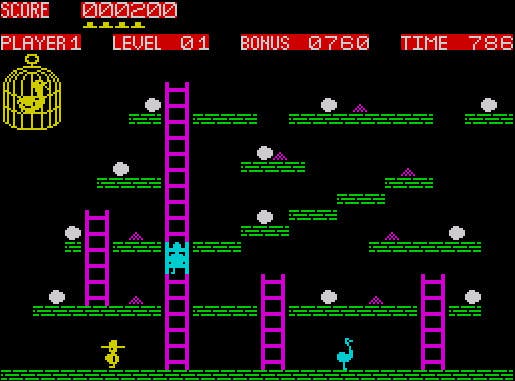
Back when the keyboard took to Kickstarter in December 2013, it was to be sold mainly as a controller for Elite's own range of Spectrum apps. In the time since the campaign finished, with just over £63k in funding, that spec has changed considerably.
The decision to expand the device's compatibility to Android opened the door to making it work with PCs, and from there it evolved into a more adaptable piece of kit than was originally planned. "Although we conceived the device as a controller for an iPad, for our apps, what it's developed into is a device that will enable you to play Spectrum games on an iPad or Android tablet," Wilcox says. "But you can also use it to play Game of Thrones on a Mac, or process your email."
It's able to do this because it has two input "layers" in the same keyboard, alternated by a switch on the back of the unit. One is what they're calling the Game Layer. This is the one that fully mimics a ZX Spectrum keyboard, using all the keys as they were originally intended, including now defunct ones such as Symbol Shift. In this mode, the keyboard detects not only when a key is pressed, but when it's released, making it more suitable for gameplay.
Switch to the QWERTY Layer and the specialist Speccy functions are disabled and it works as a modern keyboard, though there is a need to hold down some keys to access features such as F1, F2, F3 etc that didn't exist when the Speccy was designed.
We fire up Chuckie Egg on the iPad app and I have a quick play. Despite my scepticism, it's virtually indistinguishable from playing it on an actual Spectrum. Key response is crisp, the old QAOPM muscles kick back in, and the only thing missing is the tangle of wires, a creaky tape recorder on the side and my old A-Team posters on the wall. The give of the rubber keys, the slightly spongy feedback - it feels right. In terms of nostalgia, if nothing else, it's pretty much spot on.
The keyboard will be supported with a core app, which contains games and ZX Basic. I also have a tinker with the latter, bashing out a quick two line loop that fills the screen with text. It's yet to be decided how the app will save your programs, but the fact that you can even code on the thing is a pretty large step forward from the original pitch when it was simply a Bluetooth controller shaped like a Spectrum.
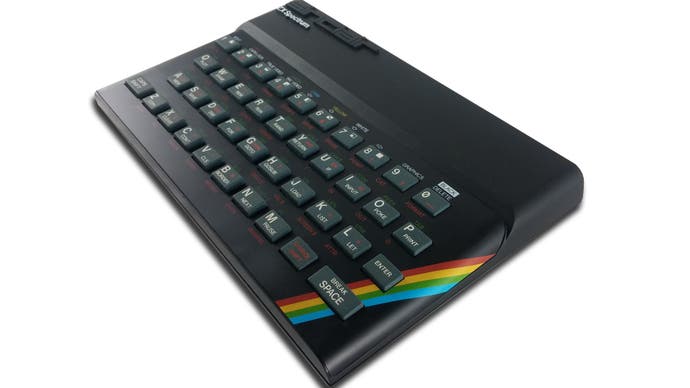
In terms of games, Chuckie Egg will definitely be included, and apparently Elite has also reached an agreement with Hewson to include their games as well. That presumably means Cybernoid, Exolon, Zynaps and other classics. Beyond that, Wilcox is coy about what will be available. "I hope by the time we launch we'll have 50 to 100 in there," is all he'll say.
Of course, one of the reasons why the line-up of games is unclear is because most of the titles that were in the original Elite apps have had to be removed following the controversy with the unpaid developers. It was an ugly situation and the developers in question have understandably withdrawn their permission for Elite to distribute their games. Given that those involved include some of the biggest names in Spectrum gaming, it's definitely damaged not only Elite's reputation but also the appetite for its Spectrum keyboard in the retro gaming community.
"It was my fault," says Wilcox candidly when I broach the subject. "I haven't made any official statements about this. When it all came to light last year, we made a statement on the website and haven't said anything since. What I will say is that it was my fault. We spent hundreds of hours tracking down the owners of these games and signing the deals, we spent thousands of hours making the apps and didn't spend enough time putting the admin together. I didn't do it properly. It was a horrible experience for everybody. That's never going to be removed from the public record."
Those problems appear to have been resolved to the satisfaction of most parties - at least according to a quick email poll of those affected. Elite has a long way to go to regain the trust of retro gamers and developers, but if nothing else at least it seems that such issues shouldn't happen again. "Going forward, we're not going to be involved in any way in the [royalties] reporting," he continues. "That's part of the license agreement for anybody who does want to license stuff for the new apps. All such funding will go straight into an Escrow account and be handled by the accountants."
Given that the keyboard was originally intended to work with Elite's generously stocked apps, I can't help wondering if having almost all of the games removed is what has prompted the device's seemingly new and open attitude to compatibility. There's now a work-in-progress guide on the official site, helping other developers to update existing apps or develop new ones to work with the keyboard, potentially cutting Elite out of the commercial loop entirely.
That's especially interesting since one of the big questions when the keyboard was first announced was whether or not it would work with rival emulators, and Elite was coy about the answer. That's certainly no longer the case. "Yes," is the unambiguous answer when I ask if I'd be able to use his keyboard to play games via the Spectaculator app, which is where a lot of the games removed from Elite's apps have now ended up. "It doesn't just have to be Spectrum games. Any game that originally was developed for a physical controller, any other emulated game on tablets, they will also work. So you could have Amiga games controlled with a Spectrum."
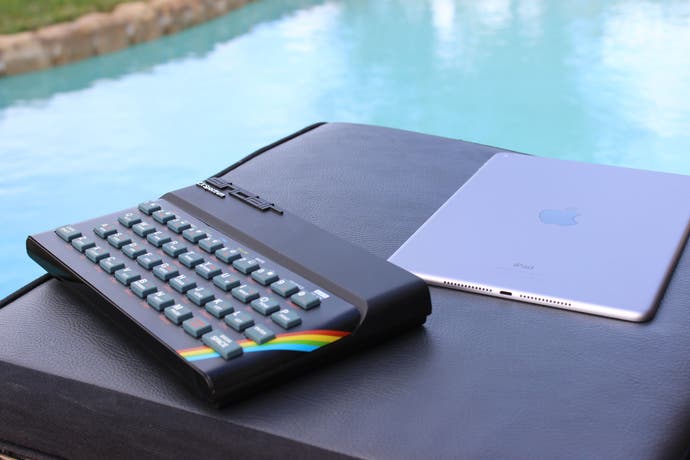
It would require the other emulators to update their apps to recognise the keyboard's Game Layer inputs, but even so that's a drastic - and welcome - change from what was originally looking like a very limited and closed device. Wilcox even thinks it could work with the Vega, the other emulated Spectrum product launching this year with the endorsement of Sir Clive Sinclair himself.
"Having digested what little information there is in the public domain about it, we think potentially the two devices could be complimentary," says Wilcox. "So we suggested to Sky, and subsequently to the guys behind the Vega, that we get together and discuss how to make them interoperable. I have to say, we haven't met with them. We haven't been invited to, sadly. Our assumption is that if they have USB or Bluetooth on the Vega, then the keyboard we produce could be a keyboard for their device."
Are retro fans really going to fork out £99 for a Recreated Spectrum, plus whatever the Vega ends up retailing for? I can't see it myself, but then I suspect I'm too immersed in retro culture to understand who either device is aimed at. Most dedicated Spectrum enthusiasts will already be using original hardware - a hundred quid will get you a nicely refurbished Speccy plus a decent selection of games on eBay or Facebook these days - while others will be quite happy with the convenience of PC emulators. I certainly can't see anyone wanting to use the Spectrum as an actual keyboard since, nostalgia aside, those rubber keys are an absolute horror to type with.
And yet I'm also, to my surprise, impressed at how the project has evolved. I'm particularly pleased to see that it actually works as a computer using ZX Basic - The Centre for Computing History has apparently ordered some to replace the BBC Model Bs in its workshops - and that the door has been opened for others to develop apps and games that work with the device, outside of Elite's control. That can only be good news for everyone.
The stink over the unpaid developer situation hasn't gone away, but it seems to have led to a device that is more interesting, more flexible and more ambitious than the Spectrum-shaped controller it began life as. Colour me cautiously intrigued.
